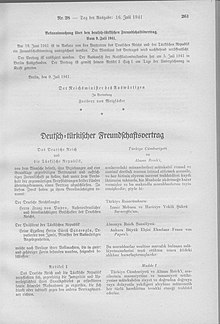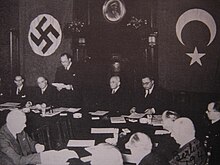German–Turkish Treaty of Friendship
The German–Turkish Treaty of Friendship (German: Türkisch-Deutscher Freundschaftsvertrag, Turkish: Türk-Alman Dostluk Paktı) was a non-aggression pact signed between Nazi Germany and Turkey on 18 June 1941 in Ankara by German ambassador to Turkey Franz von Papen and Turkish Minister of Foreign Affairs Şükrü Saracoğlu.Further, Hitler emphasised that he had ordered his troops in Bulgaria to stay far from the Turkish border to avoid making a false impression of their presence.[6] In the meantime, on 1 April 1941, Rashid Ali Al-Gaylani launched a coup d'état, which overthrew the pro-British regime in Iraq.Hitler asked Turkey for permission to pass through Turkish territory to give Iraq military assistance.Between 18 April and 3 June, Britain restored the regime of Emir Abdul-Illah, the regent of four-year-old King Faisal II.

GermanTurkishnon-aggression pactNazi GermanyTurkeyAnkaraFranz von PapenTurkish Minister of Foreign AffairsŞükrü SaracoğluTurkey declared war on Nazi GermanyWorld War IIİsmet İnönüAxis powersAlliesYugoslaviaGreeceEast Macedonia and ThraceVardar MacedoniaTripartite PactAdolf HitlerOperation 25Operation MaritaBalkan regionRashid Ali Al-Gaylanicoup d'étatAbdul-IllahKing Faisal IIchromiteUnited StatesUnited KingdomAnti-Comintern PactGermany–Turkey relationsUS State DepartmentTreaties of TurkeyDuring theWar of IndependenceTreaty of Alexandropol (Gyumri)Cilicia Peace TreatyTreaty of MoscowTreaty of KarsTreaty of Ankara (1921)Armistice of MudanyaTreaty of LausanneAfter Proclamationof the RepublicTreaty of Ankara (1926)Balkan PactMontreux ConventionTreaty of SaadabadZürich and London AgreementsAnkara AgreementAgreement on Strategic Partnership and Mutual Support